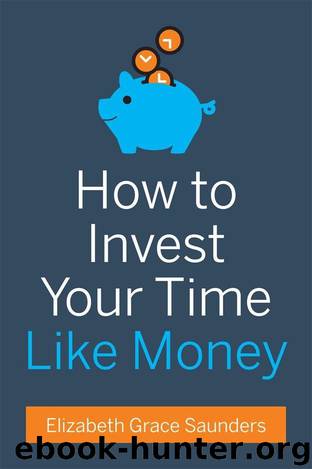How to Invest Your Time Like Money by Saunders Elizabeth Grace

Author:Saunders, Elizabeth Grace [Saunders, Elizabeth Grace]
Language: eng
Format: azw
ISBN: 9781633690615
Publisher: Harvard Business Review Press
Published: 2015-02-16T16:00:00+00:00
Step 4: Get Comfortable with Satisficing
To end up with the ideal overall time allocation, you will also need to choose to do some activities in a less-than-ideal manner. For example, you may decide not to spend more than one to two hours a day on e-mail—even if that means sending short replies or leaving some unanswered—because it will have greater impact on your career to reserve as much time as possible for other activities related to more important, desired outcomes. The power of this mentality, known as “satisficing” was explored by Dr. Barry Schwartz’s team in, “Maximizing Versus Satisficing: Happiness Is a Matter of Choice,” and is summarized by researcher Emilia Lahti in this way: “Satisficing simply means to not obsess about trying to maximize every single task outcome and ROI.”[3]
Using this technique will require you to shift from always putting other people’s priorities first to strategically deciding when it makes sense to meet a request and, if so, how much time to invest in it. Usually the actions that will make the biggest impact—the ones that should fill most of your time and need to be done excellently—will be the least likely to be prompted by external requests. For example, if you’re a professor, publishing more papers has the most significant long-term impact on your career. However, there’s not the immediate pressure to perform in this area as there is to prepare your lecture for your next class or to answer your research assistants’ questions on lab work. Or if you’re a department manager, you can contribute the most value by providing strategic vision. However, those around you will most likely be making requests to meet about tactical issues.
Once you understand the concept of satisficing, you can choose to intentionally try to fit everything else around time reserved for your top priorities, instead of the other way around. You must protect time for the activities related to your most vital priorities at home and at work if you want to have enough time for what’s most important. For example, if someone asks you to have a non-urgent meeting on a day you have blocked out to work on a particular project, it’s honest and crucial for you to say, “I’m already booked that day. How about meeting next Tuesday at 2 p.m.?” or to say, “I only can meet for twenty minutes. Will that work for you or should we schedule a longer time for another day?” Just because you don’t have a meeting scheduled with someone doesn’t mean that you have free time.
Download
This site does not store any files on its server. We only index and link to content provided by other sites. Please contact the content providers to delete copyright contents if any and email us, we'll remove relevant links or contents immediately.
| Bookkeeping | Business Mathematics |
| Business Writing | Communications |
| Decision Making | Negotiating |
| Project Management | Running Meetings & Presentations |
| Secretarial Aids & Training | Time Management |
| Training |
Nudge - Improving Decisions about Health, Wealth, and Happiness by Thaler Sunstein(7707)
Deep Work by Cal Newport(7083)
Principles: Life and Work by Ray Dalio(6449)
The Doodle Revolution by Sunni Brown(4761)
Factfulness: Ten Reasons We're Wrong About the World – and Why Things Are Better Than You Think by Hans Rosling(4742)
Eat That Frog! by Brian Tracy(4540)
Thinking in Bets by Annie Duke(4227)
Hyperfocus by Chris Bailey(4118)
Visual Intelligence by Amy E. Herman(3782)
Writing Your Dissertation in Fifteen Minutes a Day by Joan Bolker(3729)
Ogilvy on Advertising by David Ogilvy(3622)
Hidden Persuasion: 33 psychological influence techniques in advertising by Marc Andrews & Matthijs van Leeuwen & Rick van Baaren(3565)
How to Win Friends and Influence People in the Digital Age by Dale Carnegie & Associates(3562)
How to win friends and influence people by Dale Carnegie(3474)
The Pixar Touch by David A. Price(3439)
Schaum's Quick Guide to Writing Great Short Stories by Margaret Lucke(3381)
Deep Work: Rules for Focused Success in a Distracted World by Cal Newport(3237)
Work Clean by Dan Charnas(3123)
The Slow Fix: Solve Problems, Work Smarter, and Live Better In a World Addicted to Speed by Carl Honore(3009)
